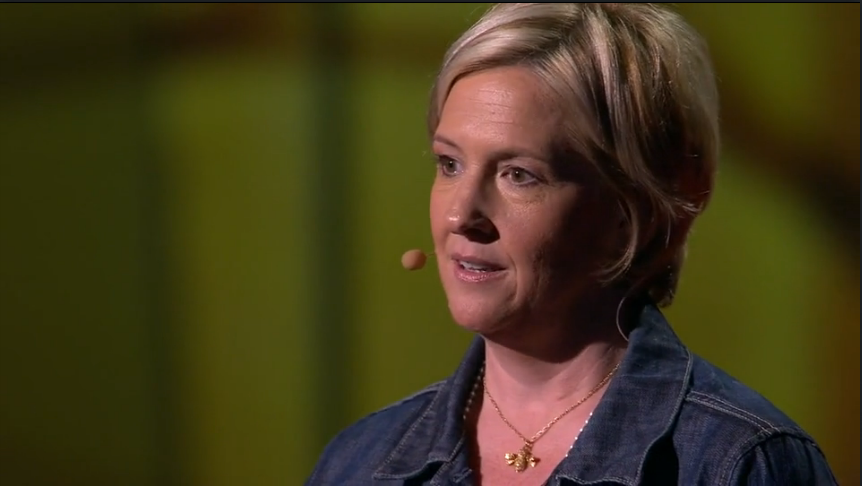I know those things that happened to you growing up.
我知道你從小到大的糗事。
I know you don't think that you're pretty, smart, talented or powerful enough.
我知道你也清楚自己不夠漂亮,或者不夠聰明或者不夠有才或者不夠強壯。
I know your dad never paid attention, even when you made CFO.
我知道即使你當上了CFO你爸爸也從來沒在意過。
Shame is that thing. And if we can quiet it down and walk in and say, "I'm going to do this,"
羞恥就是這樣。而如果我們能平靜下來,走進去對自己說:“我要做這件事,”
we look up and the critic that we see pointing and laughing, 99 percent of the time is who?
我們抬起頭,看到那些指指點點嘲笑的人,99%的時候是誰?
Us. Shame drives two big tapes -- "never good enough" -- and, if you can talk it out of that one, "who do you think you are?"
是我們自己。羞恥始終播放著這樣兩句話 -- “永遠不夠好”然后,如果你能跨過這一層,“你以為你是誰啊?”
The thing to understand about shame is, it's not guilt.
需要理解的是羞恥不是內疚。

Shame is a focus on self, guilt is a focus on behavior.
羞恥專注于自身,內疚專注于行為。
Shame is "I am bad." Guilt is "I did something bad."
羞恥是“我很糟”,內疚是“我做了很糟的事。”
How many of you, if you did something that was hurtful to me, would be willing to say, "I'm sorry. I made a mistake?"
在座的有多少人,如果你們做了一些傷害我的事,會愿意說:“對不起,我犯了個錯誤?”
How many of you would be willing to say that? Guilt: I'm sorry. I made a mistake. Shame: I'm sorry. I am a mistake.
有多少人會愿意這么說?內疚:對不起,我犯了個錯誤。羞恥:對不起,我就是個錯誤。
There's a huge difference between shame and guilt.
羞恥和內疚之間有巨大的差別。
And here's what you need to know.
大家需要知道這些。
Shame is highly, highly correlated with addiction, depression, violence, aggression, bullying, suicide, eating disorders.
羞恥是和下面這些行為高度相關的:吸毒,抑郁,暴力,侵略,欺凌,自殺,飲食失調。
And here's what you even need to know more. Guilt, inversely correlated with those things.
而更需要知道的是,內疚,則是恰恰相反。
The ability to hold something we've done or failed to do up against who we want to be is incredibly adaptive.
用我們已經做過或做錯的事 來拷問理想的自己,這種程度是可以非常靈活的。
It's uncomfortable, but it's adaptive.
它不舒服,但是是可以調節的。











